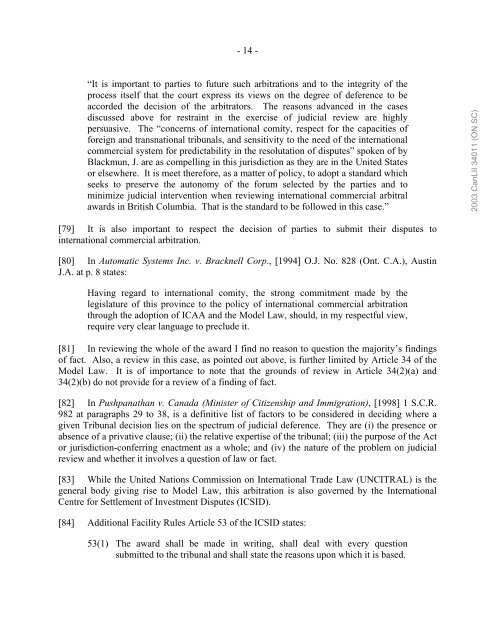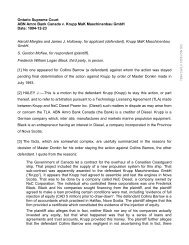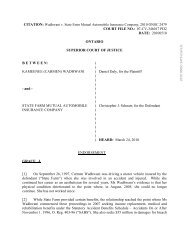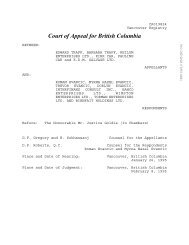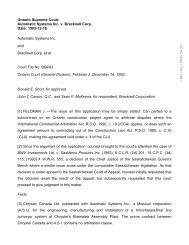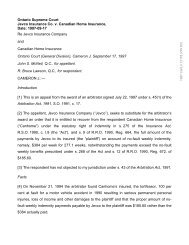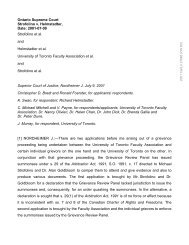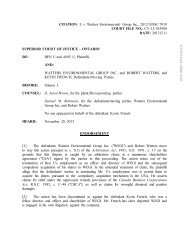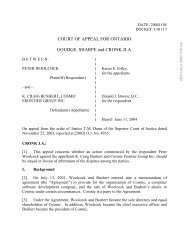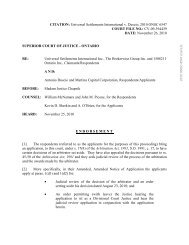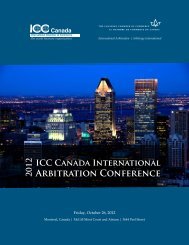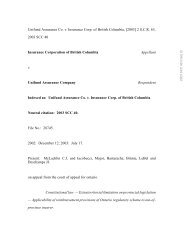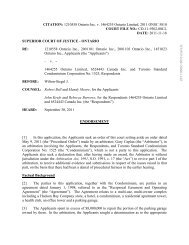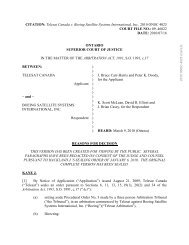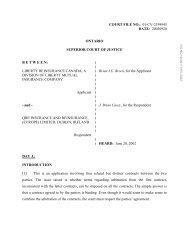United Mexican States v Karpa 2003 CanLII 34011 - Arbitration Place
United Mexican States v Karpa 2003 CanLII 34011 - Arbitration Place
United Mexican States v Karpa 2003 CanLII 34011 - Arbitration Place
- No tags were found...
Create successful ePaper yourself
Turn your PDF publications into a flip-book with our unique Google optimized e-Paper software.
- 14 -“It is important to parties to future such arbitrations and to the integrity of theprocess itself that the court express its views on the degree of deference to beaccorded the decision of the arbitrators. The reasons advanced in the casesdiscussed above for restraint in the exercise of judicial review are highlypersuasive. The “concerns of international comity, respect for the capacities offoreign and transnational tribunals, and sensitivity to the need of the internationalcommercial system for predictability in the resolutation of disputes” spoken of byBlackmun, J. are as compelling in this jurisdiction as they are in the <strong>United</strong> <strong>States</strong>or elsewhere. It is meet therefore, as a matter of policy, to adopt a standard whichseeks to preserve the autonomy of the forum selected by the parties and tominimize judicial intervention when reviewing international commercial arbitralawards in British Columbia. That is the standard to be followed in this case.”<strong>2003</strong> <strong>CanLII</strong> <strong>34011</strong> (ON SC)[79] It is also important to respect the decision of parties to submit their disputes tointernational commercial arbitration.[80] In Automatic Systems Inc. v. Bracknell Corp., [1994] O.J. No. 828 (Ont. C.A.), AustinJ.A. at p. 8 states:Having regard to international comity, the strong commitment made by thelegislature of this province to the policy of international commercial arbitrationthrough the adoption of ICAA and the Model Law, should, in my respectful view,require very clear language to preclude it.[81] In reviewing the whole of the award I find no reason to question the majority’s findingsof fact. Also, a review in this case, as pointed out above, is further limited by Article 34 of theModel Law. It is of importance to note that the grounds of review in Article 34(2)(a) and34(2)(b) do not provide for a review of a finding of fact.[82] In Pushpanathan v. Canada (Minister of Citizenship and Immigration), [1998] 1 S.C.R.982 at paragraphs 29 to 38, is a definitive list of factors to be considered in deciding where agiven Tribunal decision lies on the spectrum of judicial deference. They are (i) the presence orabsence of a privative clause; (ii) the relative expertise of the tribunal; (iii) the purpose of the Actor jurisdiction-conferring enactment as a whole; and (iv) the nature of the problem on judicialreview and whether it involves a question of law or fact.[83] While the <strong>United</strong> Nations Commission on International Trade Law (UNCITRAL) is thegeneral body giving rise to Model Law, this arbitration is also governed by the InternationalCentre for Settlement of Investment Disputes (ICSID).[84] Additional Facility Rules Article 53 of the ICSID states:53(1) The award shall be made in writing, shall deal with every questionsubmitted to the tribunal and shall state the reasons upon which it is based.


